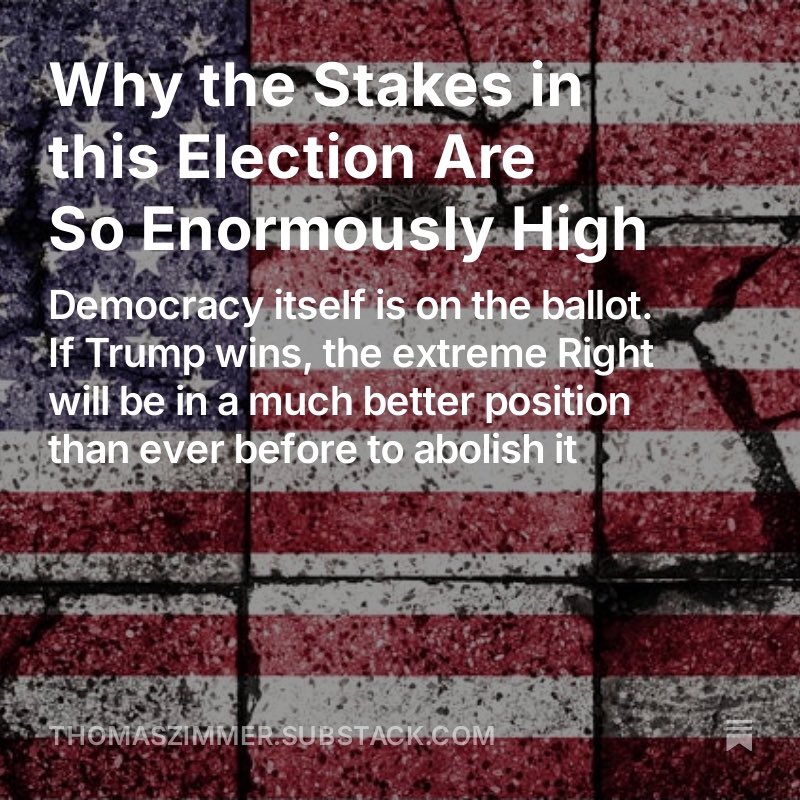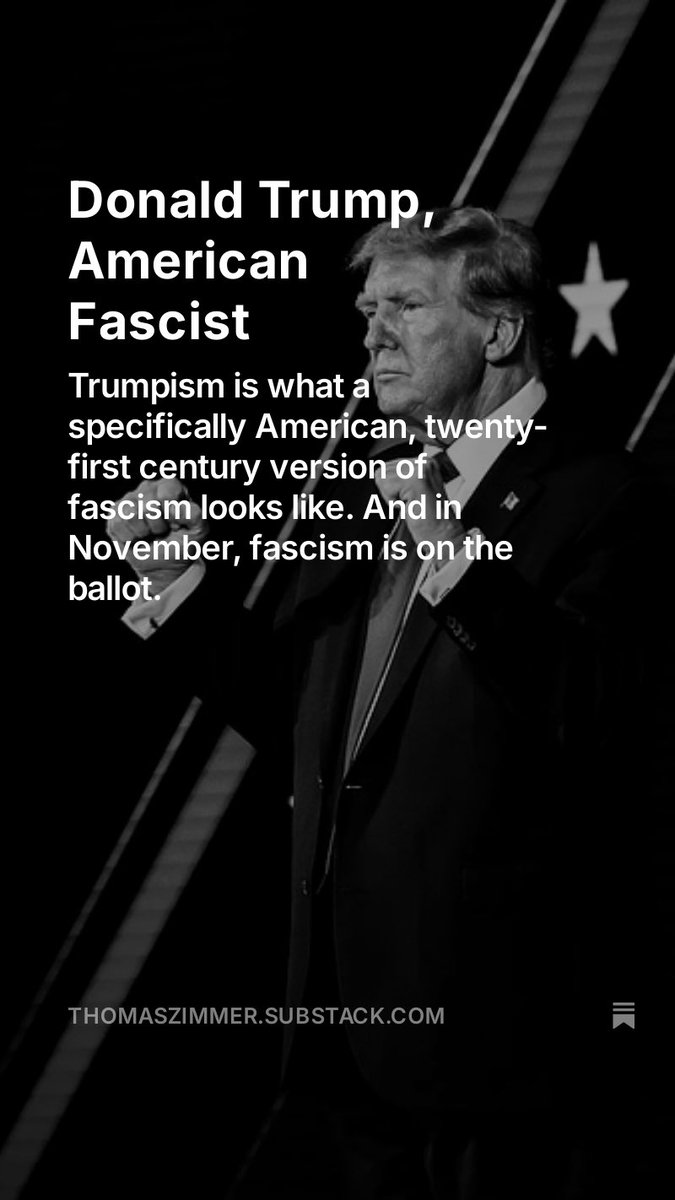Why the Stakes in this Election Are So Enormously High
Democracy itself is on the ballot. If Trump wins, the extreme Right will be in a much better position than ever before to abolish it.
Some thoughts from my new piece - while we all nervously wait (link in bio):
🧵1/
Democracy itself is on the ballot. If Trump wins, the extreme Right will be in a much better position than ever before to abolish it.
Some thoughts from my new piece - while we all nervously wait (link in bio):
🧵1/

Consider this my closing argument: As of right now, only one of the two major parties in the United States, the Democratic Party, for all its many flaws, is a (small-d) democratic party. The other one is firmly in the hands of a radicalizing ethno-nationalist movement. 2/
The fault lines in the struggle over whether or not the democratic experiment should be continued map exactly onto the fault lines of the struggle between the two parties. Democracy is now a partisan issue. Therefore, in every election, democracy itself is on the ballot. 3/
In a stable democracy, the stakes shouldn’t be that high. Elections should be competitions between political factions that accept the legitimacy of their opponents and are committed to upholding the democratic system. In America, that’s evidently not the case. 4/
This whole notion that as long as you have elections, you have democracy, reveals an incredibly naïve understanding of politics. Democracy is not just a bunch of formal procedures, it does not just mean elections. It comes with substantive commitments. 5/
The fact that we can’t just complacently rely on elections to always produce outcomes that sustain democracy is the reason why we create rules and institutions tasked with upholding and fostering a democratic political culture and defending constitutional self-government. 6/
We are here because of a system-wide failure to hold Trump accountable and mount an effective defense against the onslaught of authoritarian minority rule. And so, we are left with an election as the desperate last stand of a democracy under siege. 7/
If the leader of a fascistic movement can attempt a coup and incite a violent insurrection only to return to power four years later, without ever facing real consequences and while explicitly promising to establish a vindictive autocracy, democracy will not persist. 8/
The idea that a second Trump presidency would basically just be more of the same, a kind of rerun of the first, is diagnostically not plausible at all, and it is politically dangerous. Both Trump himself and the rightwing forces around him have drastically radicalized. 9/
And a second Trump presidency would be working with a fully Trumpified GOP, a reactionary super-majority on the Supreme Court, and with the omnipresent threat of escalating political violence intimidating anyone who dares to dissent. 10/
The challenge with Trump has always been to get the balance right between, on one hand, rejecting the populist strongman self-mythologizing and acknowledging what a clown and a buffoon the guy is – while also emphasizing that he is nevertheless acutely dangerous on the other. 11/
Let’s not be lulled into a false sense of security by the clownishness, the ridiculousness of it all. Some of history’s most successful authoritarians were considered goons and buffoons by their contemporaries – until they became goons and buffoons in power. 12/
Successful authoritarians are not remembered for being buffoons – because the disruption they brought, the suffering they caused, the horror they unleashed in power drowns out everything else. The task, therefore, is to make sure Trump is remembered as a clown. 13/
The struggle over democracy is not just one among many issues. It defines the political conflict, it’s an overarching concern that transcends and permeates all areas of public policy. It sets the conditions for how we deal (or don’t) with all the collective action challenges. 14/
I say this as a straight white man whose right to equal participation has always been a given, whose fundamental liberties have never been in doubt: Don’t we dare forget the sacrifice of those who had to fight – and are still fighting! – for every inch of democracy. 15/
Democracy can feel tiresome, frustrating. It is all about negotiating and re-negotiating conflicting interests and sensibilities. Not exactly the most rousing stuff.
But it is the day-to-day implementation of the grandest and noblest of ideas: That all people are equal.
But it is the day-to-day implementation of the grandest and noblest of ideas: That all people are equal.

• • •
Missing some Tweet in this thread? You can try to
force a refresh








